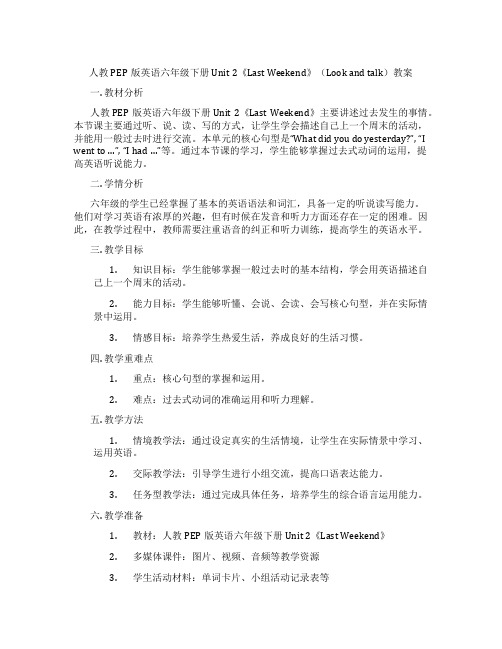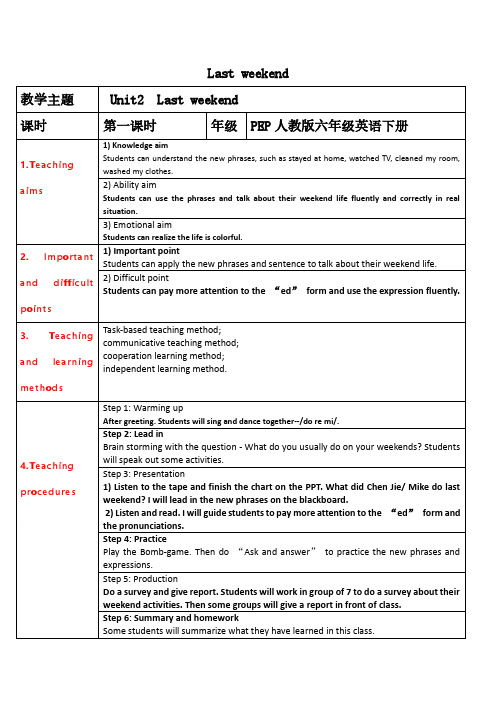人教版六年级英语下册Unit2Lastweekend(Period2)教学案.doc
- 格式:doc
- 大小:338.00 KB
- 文档页数:3

精品文档精品文档资料来源于网络资料来源于网络 仅供免费交流使用仅供免费交流使用第二课时教学内容Part A Let ’s learn Do a survey and report课时目标1.能够听、说、认读几个运用过去式的词组: cleaned my room,washed my clothes,stayed at home,watched TV 等。
等。
2.能够听、说、认读3个日常交际用语“How was your weekend ?/ It was fine,thanks./ What did you do?”,能在日常生活中正确运用这些交际用语。
,能在日常生活中正确运用这些交际用语。
重点难点1.熟练掌握本课时的单词、词组以及句子。
熟练掌握本课时的单词、词组以及句子。
2.掌握-ed 在单词末尾的发音。
教学准备多媒体课件、人物图片、卡片、录音机、磁带、日历、调查表。
教学过程一、Warm-up & Revision1. Greeting.T: Good morning, everyone.Ss: Good morning, teacher.T: How are you?Ss: I’m fine, thanks. And you?T: Very well, thanks. How do you feel today?Ss: I’m happy, tired…T: Oh, you feel tired. Let’s play a game. Ok ?Ss: OK.2. Play a game.师生玩师生玩“我来比划,你来猜”的游戏。
教师做出“我来比划,你来猜”的游戏。
教师做出watch TV watch TV, clean the room, wash the clothes,, clean the room, wash the clothes, play football 等这些短语的动作,学生根据教师的动作猜出短语。

Unit 2 Last weekend教学设计Teaching Contest:本节课主要内容是人教版PEP小学英语六年级下册第二单元《Last weekend》的Part A Let's talk部分。
本课时通过对话部分,让学生能够描述自己上周末所做的活动,并能在语境中熟练表达自己上周末以及下周末的活动安排。
Teaching Objectives:1.Knowledge & Skills能够正确朗读并理解对话;能够运用核心句型:How was your weekend? It was good. What did you do? I stayed at home with your grandma. Did you do anything else?谈论周末活动。
2.Process & Method通过分角色朗读课文、口语交际、编创对话等形式操练核心句型。
3. Emotion, Attitude & Value培养学生合理安排周末活动的意识。
Important & Difficult points:1.重点掌握核心句型:How was your weekend? It was good. What did you do? I...2.难点是能够正确理解、朗读本课时对话以及生词drank。
Teaching Aids:教学课件、相关教学图片、视频、音频。
Teaching Procedures:Step 1 Warm up1.首先,教师出示两张图片:WeChat和Microblog。
T:Did you see these pictures in your life?Ss:Yes!T:What are they? Where did you see them? When did you use them?Ss:They are Social Network Service. We can use them to chat with our friends and family, to show our happy time when we joined in the party and the trip.T:Great!Now let's see two Microblogs. What did Mike and John do last weekend?Ss:Mike cleaned his room and washed his clothes...2.Review:师生自由对话,谈论上周末的活动。

人教版PEP六年级下册英语Unit2 Lastweekend全单元教案一、教学目标知识目标1.掌握词汇:last weekend, playbasketball/tennis/badminton, listen to music, watch TV, go swimming.2.能够听、说、读、写句型:What did you do last weekend? I played basketball/tennis/badminton, I listened to music, I watched TV, I went swimming.能力目标1.能够听懂他人谈论上周末的活动内容。
2.能够用英语交流上周末做了什么。
情感目标1.培养学生的团队精神,通过团队活动提高学生的合作意识。
2.鼓励学生把周末时间用在学习和锻炼身体上,培养良好的生活习惯。
二、教学重点1.掌握词汇:last weekend, playbasketball/tennis/badminton, listen to music, watch TV, go swimming.2.能够听、说、读、写句型:What did you do last weekend? I played basketball/tennis/badminton, I listened to music, I watched TV, I went swimming.三、教学难点用英语表述自己上周末的活动内容。
四、教学过程Step 1: Warm-up观看一段视频,介绍一下上周末自己的活动内容,并邀请学生也分享一下。
Step 2: Presentation介绍单词和句型,帮助学生掌握单词的意思和用法。
Step 3: Practice1.通过听力练习,帮助学生掌握单词和句型。
2.通过口语练习,鼓励学生用英语交流上周末的活动内容。
3.小组活动:分组讨论,每个小组介绍一下上周末的活动内容,并给出相应的宣传海报。

人教PEP版英语六年级下册Unit 2《Last Weekend》(Look and talk)教案一. 教材分析人教PEP版英语六年级下册Unit 2《Last Weekend》主要讲述过去发生的事情。
本节课主要通过听、说、读、写的方式,让学生学会描述自己上一个周末的活动,并能用一般过去时进行交流。
本单元的核心句型是“What did you do yesterday?”, “I went to …”, “I had …”等。
通过本节课的学习,学生能够掌握过去式动词的运用,提高英语听说能力。
二. 学情分析六年级的学生已经掌握了基本的英语语法和词汇,具备一定的听说读写能力。
他们对学习英语有浓厚的兴趣,但有时候在发音和听力方面还存在一定的困难。
因此,在教学过程中,教师需要注重语音的纠正和听力训练,提高学生的英语水平。
三. 教学目标1.知识目标:学生能够掌握一般过去时的基本结构,学会用英语描述自己上一个周末的活动。
2.能力目标:学生能够听懂、会说、会读、会写核心句型,并在实际情景中运用。
3.情感目标:培养学生热爱生活,养成良好的生活习惯。
四. 教学重难点1.重点:核心句型的掌握和运用。
2.难点:过去式动词的准确运用和听力理解。
五. 教学方法1.情境教学法:通过设定真实的生活情境,让学生在实际情景中学习、运用英语。
2.交际教学法:引导学生进行小组交流,提高口语表达能力。
3.任务型教学法:通过完成具体任务,培养学生的综合语言运用能力。
六. 教学准备1.教材:人教PEP版英语六年级下册Unit 2《Last Weekend》2.多媒体课件:图片、视频、音频等教学资源3.学生活动材料:单词卡片、小组活动记录表等4.教师准备:教案、课件、教学资源等七. 教学过程1.导入(5分钟)利用图片或视频展示不同的周末活动,引导学生谈论自己喜欢的活动。
教师提问:“What did you do last weekend?”,学生用中文回答,激发学生对过去时态的兴趣。


人教PEP版英语六年级下册Unit 2《Last weekend》word教案一. 教材分析人教PEP版英语六年级下册Unit 2《Last weekend》主要讲述了学生们在上个周末所做的事情。
本节课的主要内容是让学生们能够运用一般过去时描述过去发生的事情。
教材通过图片和对话的形式,让学生们在真实情境中学习英语,提高他们的语言运用能力。
二. 学情分析六年级的学生已经掌握了基本的一般过去时的结构,他们可以通过图片和情境推测对话的大意,并能够用一般过去时进行简单的交流。
但是,学生们在运用一般过去时进行复杂句子的表达上还存在一定的困难,同时他们的语言运用能力和思维能力还有待提高。
三. 教学目标1.知识目标:–学生能够听懂、会说、会读本节课的主要单词和句型。
–学生能够运用一般过去时描述自己在周末所做的事情。
2.能力目标:–学生能够在真实情境中运用英语进行交流。
–学生能够通过合作学习提高自己的语言运用能力。
3.情感目标:–学生能够培养对英语学习的兴趣。
–学生能够养成积极思考的习惯。
四. 教学重难点•学生能够听懂、会说、会读本节课的主要单词和句型。
•学生能够运用一般过去时描述自己在周末所做的事情。
•学生能够运用一般过去时进行复杂句子的表达。
•学生能够在真实情境中运用英语进行交流。
五. 教学方法1.情境教学法:通过图片和情境,让学生在真实情境中学习英语,提高他们的语言运用能力。
2.交际教学法:通过小组合作和角色扮演,让学生在交流中学习英语,提高他们的语言运用能力。
3.任务型教学法:通过完成任务,让学生在实践中学习英语,提高他们的语言运用能力。
六. 教学准备1.教具:图片、课件、录音机、磁带。
2.教学资源:英语课本、练习册。
3.教学环境:教室。
七. 教学过程1.导入(5分钟)通过展示上一单元的图片,让学生们回忆上一单元学过的内容。
然后,引导学生思考:“你们知道上一个周末都做了些什么吗?”从而引出本节课的主题。
Unit 2 Last Weekend (教案) 人教PEP版英语六年级下册一、教学目标1.语言知识目标:本节课主要学习和掌握以下词汇和句型:•last weekend•visited•grandparents•went to the park•played basketball/football•had a picnic•had fun2.情感态度价值观目标:通过本节课的学习,让学生感受到家庭团聚的快乐和友谊的重要性,培养他们的家国情怀和团队合作精神。
二、教学重点和难点1.教学重点:•学习和掌握新词汇和句型。
•发展学生的听说能力。
2.教学难点:如何引导学生进行口语交流,让他们能用所学的知识进行实践。
三、教学过程1.Warming up:1.Greet the students and ask them about their weekends.2.Ask a few students to talk about what they did last weekend.2.Presentation:1.Show some pictures of different activities and ask the students to identify each activity.2.Introduce the new words and phrases that will be used in this lesson:last weekend, visited, grandparents, went to the park, played basketball/football, had a picnic, had fune gestures and visual aids to help students understand the meanings of the new words and phrases.3.Practice:1.Have the students work in pairs and ask each other what they did last weekend using the new words and phrases.2.Encourage the students to use complete sentences and share their experiences with each other.4.Production:1.Ask the students to work in groups and plan a weekend trip using the new words and phrases they learned in class.2.Each group should prepare a list of activities, places to visit, and things to bring on the trip.3.Have each group present their plan to the class, and encourage the other students to ask questions and give suggestions.四、教学反思本节课通过生动有趣的图片,帮助学生更好地理解和掌握新词汇和句型,在课堂上进行了大量的口语练习,培养了学生的听说能力。
Unit 2 Last weekendⅠ.Teaching Contents:This lesson is aim to read an feedback letter ,which is about the living experience of Wu Yifan’s family at last weekend.Ⅱ.Teaching Objectives:By the end of lesson, students should be able to:(1) Knowledge objectiveUnderstand the reasons why Wu’s family spend a bad weekend at the hotel.(2) Ability objectivesDescribe their past activities by using the general past tense of verbs such as“ was, wanted, were, didn’t, cleaned”in the feedback letter. U se “Yes,I did/No, I didn 't”to answer questions about their past activities.(3) Emotional objectiveLearn to respect others and be more tolerant.Ⅲ.Teaching Key:Use the past tense of verbs and phrases such as “was, were, didn’ t, watched TV, cleaned the room” to describe the complaint of Wu’s family. Ⅳ. Teaching Difficult Points:K now the change of tenses, and flexibly use “Yes, I did/No, I didn 't” to answer questions about past activities.Ⅴ.Teaching Procedures:Step 1 Pre-reading(8minutes)The teacher shows the calendar and asks the students to remember what did they do last weekend. After finishing, let students guess what happened to the teacher’s weekend .And predict the content of the letter.(Justification: The guessing game can arouse students' interest in the topic and attend on the main idea of the reading passage.)Step 2 While-reading ( 20minutes)Activity 1 SkimmingThe teacher asks students to read the text twice, the first time to know what did Wu’s family do at weekend. The second time to find the verbs in the feedback letter.(Justification: This step will help students get the main idea of the text and take notice of the tense of the passage.)Activity 2 ScanningThe teacher asked the students to read Wu's feedback letter to the hotel carefully, complete Wu’s families’ complaint on the blackboard.(Justification: In the process of filling the form, students' reading skill of scanning for the detailed information will be improved, and it will help student understand the text logically.)Step 3 Post-reading(12 minutes)Activity 1 Answer the questionTeacher shows some pictures ,then ask students whether Wu’s family did these activities or not .Activity 2 Retell.Students retell Wu’s complaint to the manager with the help of pictures .(Justification: Asking the activities could consolidate the sentence model”Yes,they did/No,they didn’t” .Retelling will make students havea better understanding of the text and improve their logic thinking .)Ⅵ. Affective education:The teacher show some pictures of students to share their feeling,shake hands with their them treat others sincerely and be more tolerant to people’s fault.Ⅶ. Homework:Talk about their happy time during weekends to their partners, and draw a picture of it.Ⅷ.Blackboard Design:Ⅸ.Teaching Reflection:This class is a relatively boring reading course, but through different teaching activities design, the students are seriously cooperated with. However, the classroom atmosphere is not active enough, not to mobilize the enthusiasm of all students, the tasks of the time arrangement needs further reasonable setting. In general, this course successfully completed the teaching task, achieved the teaching goal.。
Unit 2 Last weekend第 2 课时Part A Let’s try & Let’s talk教学目标:1. 复习词汇:cleaned my room, stayed at home, washed my clothes, watched TV,did,was。
2. 掌握重点句子: How was your weekend? It was good, thank you.What did you do? Didyou do anything else?教学疑难:1. 重点:学生能够认读和书写重点词汇和句子。
2. 难点:学生能够理解对话内容及一般过去时的相关问答。
教学方法:对话教学法,直接教学法教学准备:课件,《点拨》教学过程:一复习与热身1. 复习上节课学过的单词和短语:T:cleanS:cleaned/cleaned my roomT:watchS:watched/watched TVT:stayS:stayed/stayed at homeT:washS:washed/washed my clothes设计意图:注意清清浊浊发音规则。
2. 通过话题复习上节课重要句型:T:What do you often do on the weekend?S:I often clean my room/…T:What did you do yesterday?S:I watched TV/...设计意图:注意do 的过去式为did。
3.带领学生复习一般过去时:(1)一般过去时表示在过去某个时间里发生的动作或状态,常和表示过去的时间状语连用,如:last night/weekend;yesterday等。
(2)一般过去时也表示过去经常或反复发生的动作。
(3)一般情况下,动词的过去式是直接在单词末尾加-ed。
二导入听录音,完成Part A Let’s try 部分的任务。
Sarah and Mike are talking about this weekend. Listen and circle.1.Sarah and Mike are talking on _____.A. SaturdayB. Sunday2.Who is Mike going to call?A. His grandparents.B. His parents.三1. T:How are you today?Ss:I’m fine, thanks.T: How was your weekend?Ss: It was good, thank you.T: What do you often do on the weekend?Ss:I often watch TV.T:What did you do last weekend?Ss: I stayed at home with my grandma.设计意图:重点练习这几个句子。
Unit 2 last weekendPart A一、教学目标:1、能够听懂、会说、认读五个过去式词组:cleaned my room ,washed myclothes ,stayed at home ,watched TV.2、听懂、会说、能认读3个日常交际用语“How was your weekend ?””Itwas fine ,thanks.””what did you do?\I…”.3、敢于开口,表达中不要怕出错,积极参与调查活动,能学有所用。
二、教学重点:1、词汇:cleaned my room ,washed my clothes ,stayed at home ,watched TV.2、句型:“How was your weekend ?””It was fine ,thanks.””what did youdo?\I…”.三、教学难点:1、过去式ed 在单词末尾的发音。
2、一般过去式在日常生活中的运用。
四、教学用具:单词卡片,录音,ppt课件五、教学过程:Step 1:warming up1、Greeting .2、Do with me :hello ,hello, how are you ? fine, fine ,thank you .hello ,hello,how are you ? no , no ,just so-so.配带手势,全班一起,提起学生学习英语的兴趣和氛围。
Step 2:Presentation1、问话导入 ( free talk ):-- Are you happy on weekends ? \yes!--I’m glad to hear that . How about last weekend ?S: It was good /ok/great/fine. \It wasn’t very good.2、Learn new phrases :(1)the fist picture” cleaned my room” .By asking students “what do youoften do on weekend ?” They answer “clean my room”. So I ask “whatdid you do last weekend ?”students learn the new phrase “cleaned myroom“. we fist listen then say it one by one .the same method we learnthe second phrase “stayed at home”(2)the third picture “washed my clothes”, We learn it by “sit or stand”. 当我把卡片放平的时候全班同学坐着一起读,当我把卡片竖起来的时候全体站起来读。
Period 2 Section A Let’s try/Let’s learn P14 Learning aims(学习目标)
1.复习单词或词组cleaned, washed, watched, stayed, cleaned my room, washed my clothes, stayed at home, watched TV。
2.四会句子:How was your weekend ?It was good ,thank you .What did you do ?
I stayed at home with your grandma .Did you do anything else?
3.三会单词:drank 、show .
Important &difficult points(重难点)
1.重点:掌握四会句子。
2.难点:掌握一般过去时的句式特点并能正确运用。
导学探究
Step1 : 预习温故(用时5分钟)
1. Go over the old words and phrases :
T : clean S:cleaned /cleaned my room T: watch S: watched/watch TV
T: stay S: stayed/stayed at home T:wash S: washed/washed my clothes 2.Free talk :
T: What do you do on the weekend ? S: I often clean my room/…
T: What did you do? S: I watched TV/....
3.Chant together.
Step 2. 新课内容展示(用时18分钟)
1、T:How are you today ? Ss:I’m fine,thanks.
板书: T:How was your weekend ? Ss:It was good,thank you. (is 的过去式was,师生互答)
2、T:What do you often do on the weekend ? Ss:I often watch TV.
板书:T:What did you do last weekend?S: I stayed at home with your grandma.(教读) 3、(1)单词:drink –drank, drank是过去式,师带读,生跟读。
引出喝茶 drink tea—drank tea . I drank tea last weekend .
(2)句子: T:出示Mike’s爷爷奶奶喝茶、看电视的图片,
What did they do ?引导学生答:They drank tea and watched TV,师板书并教读:
We drank tea in the afternoon and watched TV。
4、板书呈现:show,children’s show,I watched some children’s show on TV.学生说意思,板书并教读。
5、T:What did you do last weekend ? S:I watched TV/….
T:Did you do anything else? Did you play football ?Did you do your homework ?...板书:Did you do anything else?学生说说意思并带读。
6、学生小组阅读对话并回答问题。
(1)What did mike’s grandpa do lastweekend ? (2)What did mike do ?
7、学生讲解对话,教师补充答疑。
8、Listen to the tape of Let’s talk and follow it.
Step 3. 合作交流,师生共建(用时7分钟)
1.教读对话,分角色朗读。
2.学生灵活运用本课时单词、词组编对话。
Eg:I washed my colthes/….
3. Listen to the tape and finish Let’s try .
Step 4. 达标检测(用时9分钟)
一、读一读,选一选。
()1.How was your weekend ? A.我们喝了下午茶还看了电视。
()2. How are you ? B.你还做了其他什么事吗?
()3.I stayed at home with your grandma. C.你周末过得怎么样?
()4.We drank tea in the afternoon and watched TV. D. 你好吗?
()5.Did you do anything else ? E.我和你奶奶在家里。
二、填一填,读一读,译一译。
1.What ____(do/did)you do last weekend ?
2.I _______ (stay/stayed)at home with my mother yesterday.
3.How ____ (is/was) your weekend ?
4.Did you do ____(anything/any)else ?
5.We ______(drink/drank)tea last Sunday.
三.看图片,选句子。
1._____
2._____
3._____
4._____
5._____ A.Mike cleaned his room last Sunday. B.Yao Ming is taller and stronger the man.
C.This egg is bigger than that one.
D.I drank tea in the afternoon.
E.Chen Jie stayed at home yesterday .
学生小结:这节课我学到了__________________________________
Step 5.布置课后作业(用时1分钟)
1、正确的格式抄写句子,并写出中文意思。
2、熟读P14Let’s talk.
Step6:板书设计
Unit 2 Last weekend
Words: drink ---drank show
Sentences: ---I stayed at home with your grandma .
---We drank tea in the afternoon and watched TV.
---Did you do anything else?
教学反思:。